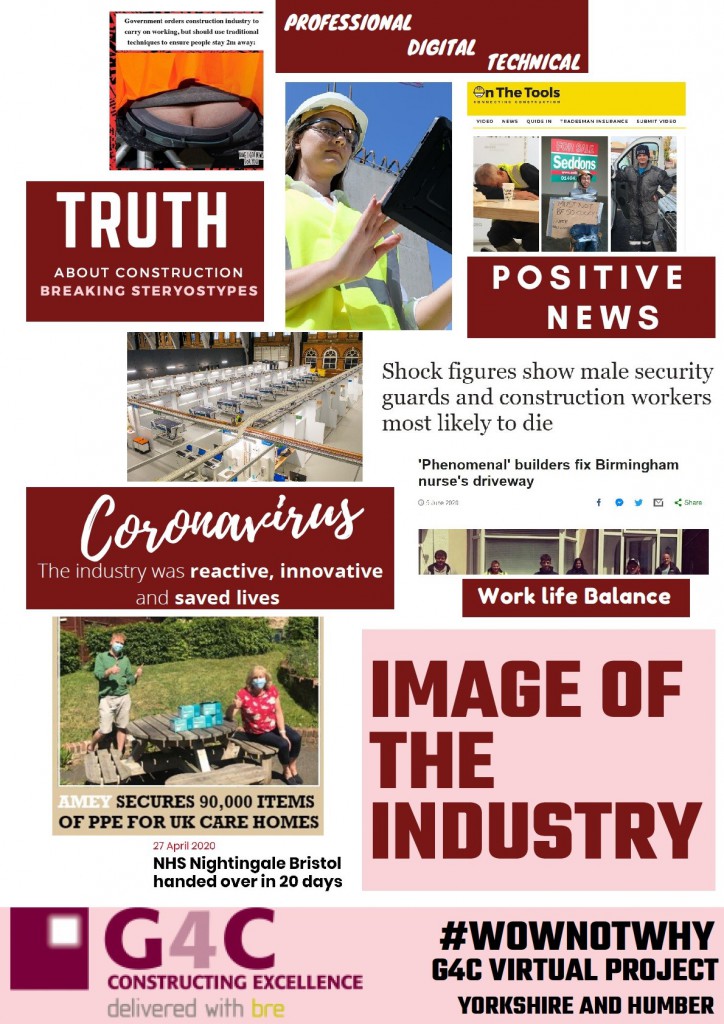The G4C Virtual Project launched on 24 April 2020, in place of the usual annual G4C Conference. G4C challenged their members to work in virtual teams to initially produce a short pitch- to be fed back to industry leaders connected to the topic of industry resilience.
The participants were asked to consider:
- What practices they wanted to get rid of;
- Which cultures they want to embed within the industry;
- What skills they have learnt over the last few weeks which could be implemented going forwards;
- What technologies and practices do they think could have been implemented sooner;
to make a more resilient industry?
Bi-weekly discussions and/or webinars were held with the teams to help them plan and develop their pitches with information webinars held periodically by Marianna Kopsida (Trimble), Rebecca Rees (Trowers & Hamlin) and Ron Lang (Construction Innovation Hub) to help give the teams ideas about potential areas they could explore.
The teams fed back to a panel comprising David Whysall, Phil Wilbraham and Alison Nicholl on 18 June 2020. The resultant pitches and ideas from the teams, were extremely impressive, with each team effectively and eloquently discussing a different aspect of an issue or point of improvement for industry as well as, impressively, providing tangible solutions.
The topics covered by the teams comprised the following, along with the following solutions:
Team: G4C North East
Topic: Communication
Solution: Creation of a dual-mentoring programme
Over the last few challenging months members of our committee have been working together on this year’s G4C Virtual Project. In context of the extraordinary changes our society is currently facing, teams from all over the country have been tasked with coming up with new ideas to make the construction industry fit for the future.
Our team bounced around some ideas and decided that one thing we struggled with as an industry (and one thing we could personally influence) was communication and knowledge sharing. In response to this the concept we’ve come up with is ‘Virt-dual’ mentoring – two-way mentoring via video conferencing.
During the coronavirus pandemic meeting with people as we usually would has been impossible, and as a result we’ve all had to become much more adept with technology, making use of applications like Microsoft Teams, Skype and Zoom to continue working.
We’re proposing to utilise this technology to bring together experienced professionals from the CENE Advisory Committee and young professionals from G4CNE to share their unique experience. This is an exceptional opportunity for the participants to understand the
perspectives of professionals from outside of their organisation, in and informal setting.
When asked about the Virt-dual mentoring programme Hollie Statham, Design Manager at Bowmer + Kirkland summarised the great potential for this scheme: “Mentoring doesn’t teach you the right or wrong way to do things, it builds a connection with someone in the industry that might not necessarily have the same role as you, but can offer guidance that you might not have been exposed to in your own workplace.”
We’re intending to have mentors and mentees paired by August. From there they will embark on a three-month programme, virtually meeting as many times as the pairs deem necessary to share their unique experience.
Team: G4C Yorkshire
Topic: Industry Image
Solution: Social media campaign- #wownotwhy
The G4C Yorkshire team explored the issues regarding the image of the industry. In a very heartfelt and personal pitch, the team summarised the public perceptions they had been subjected to, particularly during the lockdown. They queried why people don’t respond with “Wow, you work in construction” but always challenge “why”. They are on a mission to change this image and are initially planning a month of social media takeover using the hashtag #wownotwhy. We’re all looking forward to Wow Wednesdays at G4C!

Team: Asite
Topic: Integration and adoption of digitalisation and technology
Solution: Creation of a specific IT professional body and raising awareness of the benefits of digital integration
A lack of relevant digital skills, absence of buy-in at all levels, and no clear way of measuring a return on investment are just some of the many challenges that AEC organisations face when implementing information management technologies.
However, it’s not all doom and gloom; construction organisations are making strides to improve. This advancement is the result of several factors, including compliance with government initiatives, a push towards greater sustainability, and better mechanisms for talent acquisition. Additionally, the circumstances of the COVID-19 pandemic have seen this rollout accelerated.
To ensure this push succeeds, Asite has proposed a set of solutions outlining how the industry can successfully implement information management technology. From a dedicated body for IT professionals in construction to greater engagement with the supply chain, the recommendations target both individual organisations and the industry at large, helping facilitate widespread implementation and making sure no one gets left behind.
Team: G4C North West/G4C Oxford
Topic: The challenges of multi-disciplinary roles
Solution: Creation of a hub or way of raising awareness of the various roles in industry so that other trades or professions are fully aware of one another
The Problem:
- We believe that there is an issue with communication and sharing of information within the construction industry
The Result:
- A siloed industry where the various sectors do not understand each other’s roles and requirements
Our Recommendations:
Creation of a centralised “hub” which enables organisations to share best practice, lessons learned, industry guidance / standards / relevant legislation, and cost data. We propose that the “hub” should be accessible to all and free of charge, where possible. We would encourage the use of the system, through the use of incentivising, or even mandating participation and sharing of data.
Team: East Riding Council
Topic: Behaviours and collaboration between roles in a RIBA design stages context
Solution: Development of the infographic produced for the pitch into an interactive tool.
The East Riding Infrastructure & Facilities team undertook research reviewing our current procedures at each RIBA stage from the viewpoints of project manager, lead designer, and quantity surveyor, to identify opportunities for improvement, such as a greater use of BIM and compilation of more detailed briefs. A list of opportunities was created and presented to our management team and gained widespread support, and as a result are now compiling an action plan for the team to take actions forward.
G4C also discovered that an (admittedly) accidental by-product of the bi-weekly sessions was they had collectively created a uniquely safe and collaborative space for those who are junior or new to industry to get together, exchange ideas and opinions, debate industry hot topics, seek support from their peers and so much more- all without pressure, judgement or underlying agenda.
As the teams found the sessions both enjoyable and useful, G4C have decided to continue to run these drop-in sessions and extend the invitation to join us to the rest of the G4C network and beyond to join and chat all things construction and built environment with like-minded peers.
The Virtual Project has been without doubt a success at an otherwise difficult time. We are looking forward to seeing the impact of implementing the teams’ projects and the inevitable positive outcomes from the drop-in sessions.

